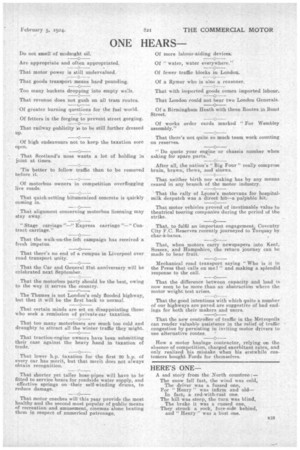ONE HEARS
Page 3

If you've noticed an error in this article please click here to report it so we can fix it.
Do not smell of midnight oil.
Are appropriate and often appropriated, That motor power is still undervalued. That goods transport means hard pounding. • Too many buckets dropping into empty wells.
That revenue does not gush on all tram routes. Of greater burning questions for the fuel world. Of fetters in the forging to prevent street gorging.
That railway publicity s to be still further dressed up.
Of high endeavours not to keep the taxation sore open.
That Scotland's nose wants a lot of holding in joint at times.
'Tis better to follow traffic than to be removed before it.
Of motorbus owners in competition overflogging live roads.
That quick-setting bitumenized concrete is quickly coming in.
That alignment concerning motorbus licensing may stay away.
" Stage carriage "—" Express carriage "—" Contract carriage."
That the walk-on-the-left campaign has received a fresh impetus.
That there's no end of a rumpus in Liverpool over road transport unity.
That the Car and General 21st anniversary will be celebrated next September.
That the motorbus party should be the best, owing to the way it serves the.country.
The Thames is not London's only flooded highway, but that it will be the first back to normal.
That certain minds are set on disappointing those who seek a remission of private-car taxation.
That too many motorbuses are much too cold and draughty to attract all the winter traffic they might.
That traction-engine owners have been submitting their case against the heavy hand in taxation of trade.
That lower h.p. taxation for the first 20 lap. of every car has merit, but that merit does not always obtain recognition.
That shorter yet taller hose-pipes will have to be fitted to service boxes for roadside water supply, and effective springs on -their self-winding drums, to reduce damage.
That motor coaches will this year provide the most healthy and the second most popular of public means of recreation and amusement, cinemas alone beating them in respect of numerical patronage. Of more labour-aiding devices.
Of " water, water everywhere."
Of fewer traffic blocks in London. Of a Rymer who is also a reasoner.
That with imported goods comes imported labour.
That London could not bear two "London Generals.
Of a Birmingham Heath with three Reotes in Bond Street.
Of works order cards marked "For Wembley assembly."
That there's not quite so much team work counting on reserves.
" Do quote your engine or chassis number when asking for spare parts."
After all, the nation's " Big Four" really comprise brain, brawn, thews, and sinews.
That neither birth nor waking has by any means ceased in any branch of the motor industry.
That the rally of Lyons's rnotorvans for hospitalmilk despatch was a direct hit—a palpable hit.
That motor vehicles proved of inestimable value to theatrical touring companies during the period of the strike.
That, to fulfil an important engagement, Coventry City F.C. Reserves recently journeyed to Torquay by char-a-ban es.
That, when motors carry newspapers into Kent, Sussex, and Hampshire, the return journey can be made to bear fruit..
Mechanical road transport saying "Who is it in the Press that calls on me ? " and making a splendid response to the call.
That the difference between capacity and load is now seeu to be more than an abstraction where the motor weight test arises.
That the good intentions with which quite a number of our highways are paved are suggestive of bad endings for both their makers and users.
That the new controller of traffic in the Metropolis can render valuable assistance in the relief of traffic congestion by persisting in inviting motor drivers to use alternative routes.
How a motor haulage contractor, relying on the absence of competition, charged exorbitant rates, and only realized his mistake when his erstwhile customers bought Fords for themselves.




























